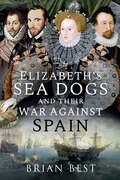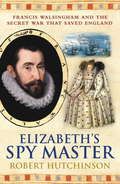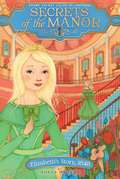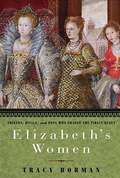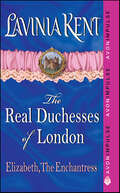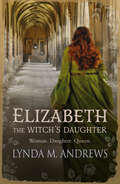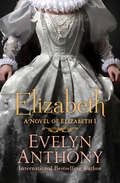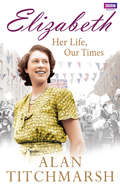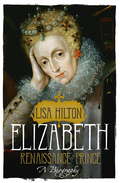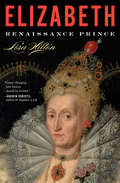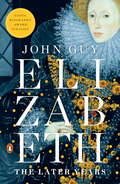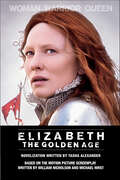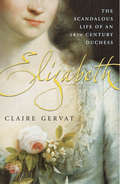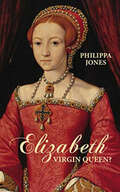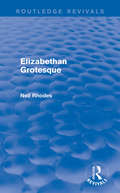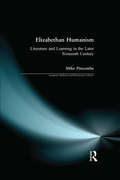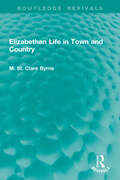- Table View
- List View
Elizabeth's London: Everyday Life in Elizabethan London (Life of London #1)
by Liza PicardLike its popular and acclaimed predecessors, Restoration London and Dr Johnson's London, thisfascinating evocation of Elizabethan London is the result of the author's passionate interest in the practical details of everyday life and the conditions in which most people lived, which most history books ignore: the streets, houses and gardens; cooking, housework and shopping; clothes, jewellery and make-up; medicine and sex; education, etiquette and hobbies; religion, law and crime.Read by Liza Picard(p) 2003 Orion Publishing Group
Elizabeth's Rival: The Tumultuous Life Of The Countess Of Leicester: The Romance And Conspiracy That Threatened Queen Elizabeth's Court
by Nicola TallisFavorite, foe, rival—a gripping tale of the countess who dared cross a queen amidst the dangerous intrigues of Elizabethan England. A kinswoman to Elizabeth I, Lettice Knollys had begun the Queen’s glittering reign basking in favor and success. It was an honor that she would enjoy for two decades. However, on the morning of September 21st, 1578, Lettice made a fateful decision. When the Queen learned of it, the consequences were swift. Lettice had dared to marry without the Queen’s consent. But worse, her new husband was Robert Dudley, Earl of Leicester, the Queen’s favorite and one-time suitor. Though she would not marry him herself, Elizabeth was fiercely jealous of any woman who showed an interest in Leicester. Knowing that she would likely earn the Queen’s enmity, Lettice married Leicester in secret, leading to her permanent banishment from court. Elizabeth never forgave the new Countess for what she perceived to be a devastating betrayal, and Lettice permanently forfeited her favor. She had become not just Queen Elizabeth’s adversary. She was her rival. But the Countess’ story does not end there. Surviving the death of two husbands and navigating the courts of three very different monarchs: Henry VIII, Elizabeth I, and Charles I, Lettice’s story offers an extraordinary and intimate perspective on the world she lived in.
Elizabeth's Sea Dogs and their War Against Spain
by Brian BestThis maritime history recounts the exploits of sixteenth century English privateers in conflict with the Spanish Empire.The Sea Dogs were seafaring merchants who originally traded mainly with Holland and France. During Queen Elizabeth’s reign, however, they began sailing further afield, spreading the reach of English exploration and plundering. At that time, England was a relatively impoverished country. But it soon found a new source of wealth in the Caribbean—a region that had been the colonial domain of wealthy Catholic Spain.The first man to trade with the Spanish Main was John Hawkins, who traveled to West Africa, captured the natives and transported them to the Caribbean. There he sold them to plantation owners in exchange for goods such as pearls, hides, and spices. His backers included the Queen herself, who encouraged the Sea Dogs to seek greater riches. This led to conflict with Spanish ships that would spark the Anglo-Spanish War.The main thorn in the Spanish side was Francis Drake. Despite efforts to kill or capture him, he continued to plunder the high seas, bringing back Spanish riches to England. This allowed Elizabeth to flourish. It was thanks in main to the privateering exploits of the Sea Dogs that England became so wealthy, paving the way for the Renaissance that followed.
Elizabeth's Spymaster
by Robert HutchinsonThe incredible real life story of the world's first super spyFrancis Walsingham was the first 'spymaster' in the modern sense. His methods anticipated those of MI5 and MI6 and even those of the KGB. He maintained a network of spies across Europe, including double-agents at the highest level in Rome and Spain - the sworn enemies of Queen Elizabeth and her Protestant regime. His entrapment of Mary Queen of Scots is a classic intelligence operation that resulted in her execution. As Robert Hutchinson reveals, his cypher expert's ability to intercept other peoples' secret messages and his brilliant forged letters made him a fearsome champion of the young Elizabeth. Yet even this Machiavellian schemer eventually fell foul of Elizabeth as her confidence grew (and judgement faded). The rise and fall of Sir Francis Walsingham is a Tudor epic, vividly narrated by a historian with unique access to the surviving documentary evidence.
Elizabeth's Spymaster
by Robert HutchinsonThe incredible real life story of the world's first super spyFrancis Walsingham was the first 'spymaster' in the modern sense. His methods anticipated those of MI5 and MI6 and even those of the KGB. He maintained a network of spies across Europe, including double-agents at the highest level in Rome and Spain - the sworn enemies of Queen Elizabeth and her Protestant regime. His entrapment of Mary Queen of Scots is a classic intelligence operation that resulted in her execution. As Robert Hutchinson reveals, his cypher expert's ability to intercept other peoples' secret messages and his brilliant forged letters made him a fearsome champion of the young Elizabeth. Yet even this Machiavellian schemer eventually fell foul of Elizabeth as her confidence grew (and judgement faded). The rise and fall of Sir Francis Walsingham is a Tudor epic, vividly narrated by a historian with unique access to the surviving documentary evidence.
Elizabeth's Story, 1848
by Adele WhitbyDiscover the chilling secrets surrounding Maggie O'Brien's disappearance from Chatswood Manor in the third book of an irresistibly entertaining historical fiction mystery series.Elizabeth and Katherine Chatswood are on the verge of turning twelve years old, which means that the grandest birthday ball in all of England is just a few weeks away! Chatswood Manor is bustling with activity, but in the midst of all the excitement, an Irish refugee named Sean O'Brien shows up in search of his long lost wife Maggie, who was employed at Chatswood Manor many years ago. Mr. O'Brien is turned away by Chatswood's stern butler, but not before Elizabeth and Katherine hear his story. Through Mr. O'Brien they also find out about the potato famine in Ireland, and are shocked and saddened to hear that so many people are suffering in a place that's not that far away. The twins vow to not only help Mr. O'Brien find Maggie, but also to somehow help the people of Ireland. But how are two young girls in a manor home in England going to help starving people in Ireland? After their papa tells them it's not their problem to worry about fixing, they have no choice but to come up with a very ambitious--and very top secret--plan. Meanwhile, as they investigate Maggie's disappearance, they uncover some startling clues, which lead them to discover even deeper mysteries hidden within Chatswood Manor.
Elizabeth's Women: Friends, Rivals, and Foes Who Shaped the Virgin Queen
by Tracy BormanA source of endless fascination and speculation, the subject of countless biographies, novels, and films, Elizabeth I is now considered from a thrilling new angle by the brilliant young historian Tracy Borman. So often viewed in her relationships with men, the Virgin Queen is portrayed here as the product of women—the mother she lost so tragically, the female subjects who worshipped her, and the peers and intimates who loved, raised, challenged, and sometimes opposed her.In vivid detail, Borman presents Elizabeth’s bewitching mother, Anne Boleyn, eager to nurture her new child, only to see her taken away and her own life destroyed by damning allegations—which taught Elizabeth never to mix politics and love. Kat Astley, the governess who attended and taught Elizabeth for almost thirty years, invited disaster by encouraging her charge into a dangerous liaison after Henry VIII’s death. Mary Tudor—“Bloody Mary”—envied her younger sister’s popularity and threatened to destroy her altogether. And animosity drove Elizabeth and her cousin Mary Queen of Scots into an intense thirty-year rivalry that could end only in death.Elizabeth’s Women contains more than an indelible cast of characters. It is an unprecedented account of how the public posture of femininity figured into the English court, the meaning of costume and display, the power of fecundity and flirtation, and how Elizabeth herself—long viewed as the embodiment of feminism—shared popular views of female inferiority and scorned and schemed against her underlings’ marriages and pregnancies.Brilliantly researched and elegantly written, Elizabeth’s Women is a unique take on history’s most captivating queen and the dazzling court that surrounded her. From the Hardcover edition.
Elizabeth, The Enchantress: The Real Duchesses of London
by Lavinia KentRegency England just got real(ity)Episode 4: How to Succeed in Marriage without Really TryingElizabeth, the Countess of Westhampton,has found her husband. Unfortunately, she wouldhave preferred that he stayed lost! How is shesupposed to react when the man who married her,and then abandoned her without awedding night, suddenly reappears? Obviously,she’ll have to plan her revenge very carefully…
Elizabeth, The Witch's Daughter
by Lynda M. AndrewsFrom princess, to outcast, to powerful monarch, the tumultuous beginnings of the Virgin Queen are brought to life by the #1 bestselling author. It is recorded that never once during her life did Elizabeth Tudor speak of her mother Anne Boleyn; but did she never think of her? As a little girl, Elizabeth Tudor knows she is a princess but one day is suddenly told she is now &“the Lady Elizabeth.&” She witnesses from the sidelines the glittering splendor of her father&’s court, and the terrifying consequences of his wrath. With few she can trust, Elizabeth comes to womanhood during the reigns of her brother and sister, shrouded by a web of deceit. She lives in constant danger, yet rises above her detractors to defy her mother&’s legacy, and go down in history as one of England&’s most ruthless and powerful monarchs. Her life became a testament to the ambitions demonstrated of her parents. Just how much of an influence did Henry VIII&’s most notorious wife have on her child? And was Elizabeth&’s accession Anne Boleyn&’s final triumph over death? A powerful and compelling tale, this is the perfect read for fans of Anne O&’Brien, Elizabeth Chadwick, and Alison Weir. It is the first of four newly reissued classics of historical fiction, which also include The Tudor Heritage, The White Lion of Norfolk and The Danish Queen.
Elizabeth: A Biography of Britain's Queen
by Sarah BradfordA comprehensive biography of Elizabeth II.
Elizabeth: A Novel of Elizabeth I
by Evelyn AnthonyA historical novel spanning the first thirty years of Elizabeth I&’s reign, telling the intimate story of England&’s greatest sovereign The sickly Catholic fanatic Mary Tudor has reigned for six years when her half-sister Elizabeth ascends to the throne. After enduring years of exile following the execution of her mother, Anne Boleyn, the twenty-five-year-old Elizabeth inherits a realm divided by religious turmoil and financial collapse. She has already survived her own personal hell, nearly losing her life after her stepfather seduced her at thirteen. The ambitious Lord Admiral left her virginity intact, but took something far more valuable—her dignity and pride. Elizabeth learned a bitter lesson: There&’s no place for love in a royal&’s heart. This novel journeys through the first three decades of the reign of Elizabeth I, including her volatile relationship with Lord Robert Dudley. From bedroom intrigues to affairs of state, Elizabeth brings to life the passion and the power, illuminating the woman who, in spite of herself, still yearned for human connection. She found it with Dudley&’s successor, the wealthy, dazzlingly attractive Earl of Leicester. Award-winner Evelyn Anthony chronicles the monarch's long battle with her cousin Mary, Queen of Scots, for the throne, and advances a fascinating theory about who murdered Lord Robert&’s first wife, Amy Dudley.
Elizabeth: An intimate portrait from the writer who knew her and her family for over fifty years
by Gyles BrandrethTHE NO 1 SUNDAY TIMES BESTSELLER NOW FEATURING EXCLUSIVE MATERIAL ABOUT CHARLES III's CORONATION WITH ADDED PHOTOGRAPHSA personal account of the life and character of Britain's longest-reigning monarch, from the writer who knew her family best'Compelling . . . Fascinating' DAILY MAIL'The writer who got closest to the human truth about our long-serving senior royals' THE TIMES'The book overflows with nuggets of insider knowledge' TELEGRAPHPaints a unique picture of the remarkable woman who reigned for seven decades. Fascinating insights' HELLO!__________Gyles Brandreth first met the Queen in 1968, when he was twenty.Over the next fifty years he met her many times, both at public and at private events. Through his friendship with the Duke of Edinburgh, he was given privileged access to Elizabeth II.He kept a record of all those encounters, and his conversations with the Queen over the years, his meetings with her family and friends, and his observations of her at close quarters are what make this very personal account of her extraordinary life uniquely fascinating.From her childhood in the 1920s to the era of Harry and Meghan in the 2020s, from her war years at Windsor Castle to her death at Balmoral, this is both a record of a tumultuous century of royal history and a truly intimate portrait of a remarkable woman.Enjoy this special edition now featuring an exclusive postscript about King Charles III's Coronation with photographs.__________Praise for Gyles Brandreth's bestselling royal writing:'Beautifully written book. I have read many other books about Philip but this is the best' DAILY EXPRESS'Brilliant, totally inspiring . . . It's a joy to read a book that comes from a perspective of fondness' KIRSTIE ALLSOPP, THE TIMES'As a sparkling celebration of Prince Philip, the book will be hard to beat' TELEGRAPH'So readable and refreshing even after the millions of words that have been written about Prince Philip in the past couple of weeks' THE TIMES'Brilliant . . . There is so much in this book you won't find anywhere else' LORRAINE
Elizabeth: Her Life, Our Times
by Alan TitchmarshOn 2 June 1953, 27-year-old Princess Elizabeth of York was crowned Queen, the eyes of the world upon her as she dedicated herself to her country. It is fascinating to look back over the sixty years since then and see how this remarkable woman, decade by decade, has brought the monarchy into the modern world, earning admiration and respect for her unerring sense of duty, her determination to innovate, her tremendous dignity, integrity and wisdom.Drawing from his own experience and time spent with the royal family, alongside additional meticulous research, Alan Titchmarsh observes the woman, the mother and the monarch. He explores key moments in her reign, both personal to her and in a wider historical context, and traces how our relationship with the royal family has developed and morphed, gone through ups and downs, but is arguably now stronger than ever in this very special anniversary year.Featuring wonderful memorabilia and rarely seen archive photography, Elizabeth II: Her Life, Our Times defines an era, pays tribute to our inexhaustable Queen and celebrates the example of responsibility, loyalty and patriotism she has set for generations past, present and future. She is an inspiration to us all.
Elizabeth: Renaissance Prince
by Lisa HiltonA definitive portrait of one of the most compelling monarchs England has ever had: Elizabeth I.'We are a prince from a line of princes.'Lisa Hilton's majestic biography of Elizabeth I, 'The Virgin Queen', uses new research to present a fresh interpretation of Elizabeth as a queen who saw herself primarily as a Renaissance prince, delivering a very different perspective on her emotional and sexual life, and upon her attempts to mould England into a European state. Elizabeth was not an exceptional woman but an exceptional ruler, and this book challenges readers to reassess her reign, and the colourful drama, scandal and intrigue to which it is always linked.
Elizabeth: Renaissance Prince
by Lisa HiltonA definitive portrait of one of the most compelling monarchs England has ever had: Elizabeth I.'We are a prince from a line of princes.'Lisa Hilton's majestic biography of Elizabeth I, 'The Virgin Queen', uses new research to present a fresh interpretation of Elizabeth as a queen who saw herself primarily as a Renaissance prince, delivering a very different perspective on her emotional and sexual life, and upon her attempts to mould England into a European state. Elizabeth was not an exceptional woman but an exceptional ruler, and this book challenges readers to reassess her reign, and the colourful drama, scandal and intrigue to which it is always linked.
Elizabeth: Renaissance Prince
by Lisa HiltonThis surprising portrait of the Tudor queen offers an &“ambitious re-examination of the intersection of gender and monarchy&” (The New York Times Book Review). Queen Elizabeth I was all too happy to play on courtly conventions of gender when it suited her &“&‘weak and feeble&’ woman&’s body&” to do so for political gain. But in Elizabeth, historian Lisa Hilton offers ample evidence why those famous words should not be taken at face value. With new research out of France, Italy, Russia, and Turkey, Hilton&’s fresh interpretation is of a queen who saw herself primarily as a Renaissance prince—an expert in Machiavellian statecraft. Elizabeth depicts a sovereign less constrained by her femininity than most accounts claim, challenging readers to reassess Elizabeth&’s reign and the colorful drama and intrigue to which it is always linked. It&’s a fascinating journey that shows how a marginalized newly crowned monarch, whose European contemporaries considered her to be the illegitimate ruler of a pariah nation, ultimately adapted to become England&’s first recognizably modern head of state.
Elizabeth: The Forgotten Years
by John GuyA groundbreaking reconsideration of our favorite Tudor queen, Elizabeth is an intimate and surprising biography that shows her at the height of her power by the bestselling, Whitbread Award-winning author of Queen of Scots. Elizabeth was crowned at twenty-five after a tempestuous childhood as a bastard and an outcast, but it was only when she reached fifty and all hopes of a royal marriage were dashed that she began to wield real power in her own right. For twenty-five years she had struggled to assert her authority over advisers who pressed her to marry and settle the succession; now, she was determined not only to reign but also to rule. In this magisterial biography of England's most ambitious Tudor queen, John Guy introduces us to a woman who is refreshingly unfamiliar: at once powerful and vulnerable, willful and afraid. In these essential and misunderstood forgotten years, Elizabeth confronts challenges at home and abroad: war against the Catholic powers of France and Spain, revolt in Ireland, an economic crisis that triggered riots in the streets of London, and a conspiracy to place her cousin Mary Queen of Scots on her throne. For a while she was smitten by a much younger man, but could she allow herself to act on that passion and still keep her throne? For the better part of a decade John Guy mined long-overlooked archives, scouring court documents and handwritten letters to sweep away myths and rumors. This prodigious historical detective work has made it possible to reveal for the first time the woman behind the polished veneer: wracked by insecurity, often too anxious to sleep alone, voicing her own distinctive and surprisingly resonant concerns. Guy writes like a dream, and this combination of groundbreaking research and propulsive narrative puts him in a class of his own.From the Hardcover edition.
Elizabeth: The Golden Age
by Tasha AlexanderThe reign of Queen Elizabeth I was a time of war, passion, and spectacular achievement. Elizabeth: The Golden Age finds Elizabeth facing bloodlust for her throne and familial betrayal. Growing keenly aware of the changing religious and political tides of late sixteenth-century Europe, Elizabeth faces an open challenge from the Spanish King Philip II, who is determined to restore England to Catholicism with his powerful army and dominating armada.Preparing to go to war to defend her empire, Elizabeth struggles to balance ancient royal duties with an unexpected vulnerability: her love for the seafarer Sir Walter Raleigh. But he remains forbidden for a queen who has sworn body and soul to her country.Yet as she charts her course abroad, treachery is the rot behind the glittering royal throne. Her most trusted adviser uncovers an assassination plot that could topple the throne, and the traitors may even include Elizabeth's own cousin Mary Stuart.Based on the sequel to the Academy Award®-winning Elizabeth, Elizabeth: The Golden Age tells the thrilling tale of an era—the story of one woman's crusade to control love, crush enemies, and secure her position as a beloved icon of the Western world.
Elizabeth: The Scandalous Life of an 18th Century Duchess
by Claire GervatElizabeth Chudleigh was one of the eighteenth century's most colourful characters. Born into impoverished gentility, her beauty, wit and vitality soon earned her a place at the centre of court life. When she married the Duke of Kingston in 1769 she had reached the highest rung of the social ladder. But Elizabeth was carrying a dark secret. In 1744 she had secretly married a naval lieutenant called Augustus Hervey, and after the Duke's death her first marriage was discovered. Bigamy fever swept London society and, in a very public trial, Elizabeth was found guilty. But her strength of character ensured that, even when her friends deserted her, her courage and zest for life did not. In an engaging history of this strong and wilful woman, Gervat shows there was far more to Elizabeth than the caricature villain her contemporaries made her out to be.
Elizabeth: The Struggle for the Throne
by David StarkeyTraces the early years of Elizabeth I before she became Queen in 1558. Covers the end of the reign of Henry VIII as well as the reigns of his son Edward VI and his daughter Mary.
Elizabeth: Virgin Queen?
by Phillipa JonesThe author of The Other Tudors delves into the Virgin Queen myth, Elizabeth&’s secret &“love life,&” and the children she may have had as a result. &“Virgin Queen&” is the name for which the powerful and fearless daughter of Henry the Eighth and Anne Boleyn is best remembered, and may explain why Elizabeth was the last of the Tudor monarchs. But how appropriate is that reputation? Were Elizabeth&’s suitors and favorites really just innocent intrigues? Or were they much more than that? Was Elizabeth really a woman driven by her passions, who had affairs with several men, including Thomas Seymour, while he was still the husband of her guardian Catherine Parr, and Robert Dudley, Earl of Leicester—a man adjudged to have been the great love of her life? Are the rumors of Elizabeth&’s illegitimate children true? Was the &“Virgin Queen&” image a carefully thought out piece of Tudor propaganda? Historian Philippa Jones, author of the acclaimed The Other Tudors, challenges the many myths and truths surrounding Elizabeth&’s life and reveals the passionate woman behind the scenes.
Elizabethan Grotesque
by Neil RhodesDescribes a type of drama first introduced in the 1590s. Instances include material by many playwrights--Johnson, Shakespeare, Marlowe, et al. Contains many footnotes.
Elizabethan Grotesque (Routledge Revivals)
by Neil RhodesThe comic grotesque is a powerful element in a great deal of Elizabethan literature, but one which has attracted scant critical attention. In this study, first published in 1980, Neil Rhodes examines the nature of the grotesque in late sixteenth-century culture, and shows the part it played in the development of new styles of comic prose and drama in Elizabethan England. In defining ‘grotesque’, the author considers the stylistic techniques of Rabelais and Aretino, as well as the graphic arts. He discusses the use of the grotesque in Elizabethan pamphlet literature and the early satirical journalists such as Nashe, and argues that their work in turn stimulated the growth of satirical drama at the end of the century. The second part of the book explains the importance of Nashe’s achievement for Shakespeare and Jonson, concluding that the linguistic resources of English Renaissance comedy are peculiarly – and perhaps uniquely – physical.
Elizabethan Humanism: Literature and Learning in the Later Sixteenth Century (Longman Medieval and Renaissance Library)
by Michael PincombeThe term 'humanist' originally referred to a scholar of Classical literature. In the Renaissance and particularly in the Elizabethan age, European intellectuals devoted themselves to the rediscovery and study of Roman and Greek literature and culture. This trend of Renaissance thought became known in the 19th century as 'humanism'. Often a difficult concept to understand, the term Elizabethan Humanism is introduced in Part One and explained in a number of different contexts. Part Two illustrates how knowledge of humanism allows a clearer understanding of Elizabethan literature, by looking closely at major texts of the Elizabethan period which include Spenser's, 'The Shepherd's Calendar'; Marlowe's 'Faustus' and Shakespeare's 'Hamlet'.
Elizabethan Life in Town and Country (Routledge Revivals)
by M. St. ByrneSince its first appearance in 1925, Elizabethan Life in Town and Country (1961) has securely established itself both for the general reader and the student as an accepted authority for the social history of the age. Its range and method are indicated by the reviewer who hailed it as ‘more enthralling than a best-seller’, and by the Times Literary Supplement which described it as having ‘almost every sentence based on contemporary description’.


